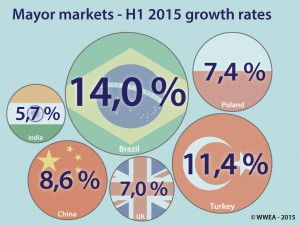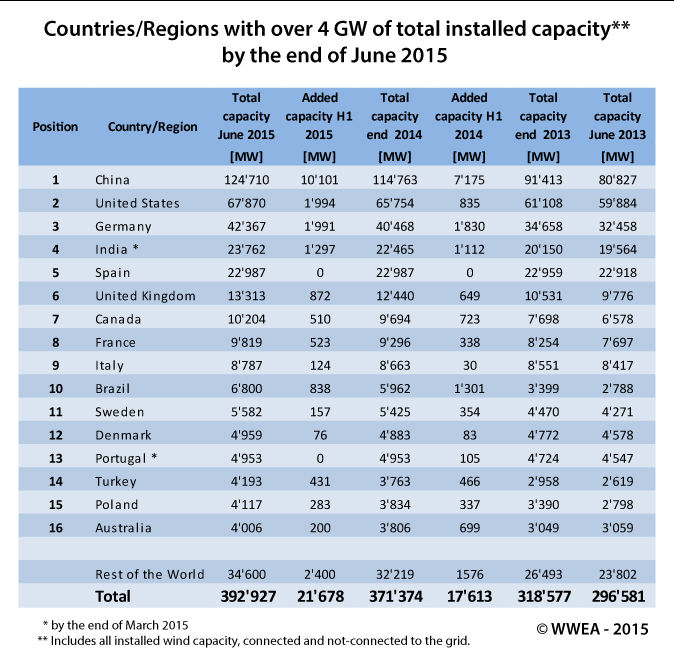
– 21,7 GW of new installations in the first half of 2015, after 17 GW in 2014
– Worldwide wind capacity has reached 392 GW, 428 GW expected for full year
– China close to 125 GW of installed capacity
– Newcomer Brazil: fourth largest market for new wind turbines
Bonn (WWEA) – The worldwide wind capacity reached 392’927 MW by the end of June 2015, out of which 21’678 MW were added in the first six months of 2015. This increase is substantially higher than in the first half of 2014 and 2013, when 17,6 GW respectively 13,9 GW were added. All wind turbines installed worldwide by mid-2015 can generate 4 % of the world’s electricity demand.
The global wind capacity grew by 5,8% within six months (after 5,6 % in the same period in 2014 and 4,9 % in 2013) and by 16,8 % on an annual basis (mid-2015 compared with mid-2014). In comparison, the annual growth rate in 2014 was lower (16,5 %).
Reasons for the relatively positive development of the worldwide wind markets are certainly the economic advantages of wind power, after all its increasing competitiveness, uncertainties regarding the international oil and gas supply, and the pressing need to go for emission free technologies in order to mitigate climate change and air pollution.

 Stefan Gsänger, WWEA Secretary General: “The world market for wind power is booming like never before, and we expect new record installations for the total year 2015. The main markets are still China – with an astonishing growth of more than 10 Gigawatt within six months – USA, Germany and India. Brazil showed the highest growth rate of all major markets, the country has increased its wind power capacity by 14 % since the beginning of this year. However, several of the European markets are now very flat, and also the largest European market Germany expects a major slowdown in the coming one to two years, after the expected regulatory changes are in force.
Stefan Gsänger, WWEA Secretary General: “The world market for wind power is booming like never before, and we expect new record installations for the total year 2015. The main markets are still China – with an astonishing growth of more than 10 Gigawatt within six months – USA, Germany and India. Brazil showed the highest growth rate of all major markets, the country has increased its wind power capacity by 14 % since the beginning of this year. However, several of the European markets are now very flat, and also the largest European market Germany expects a major slowdown in the coming one to two years, after the expected regulatory changes are in force.
The wind industry globally is today driven by a large variety of shareholders and stakeholders, from small and medium sized enterprises, large industries, energy cooperatives to environmental groups. For the future success, it will be crucial to continue and rather increase this variety.”
